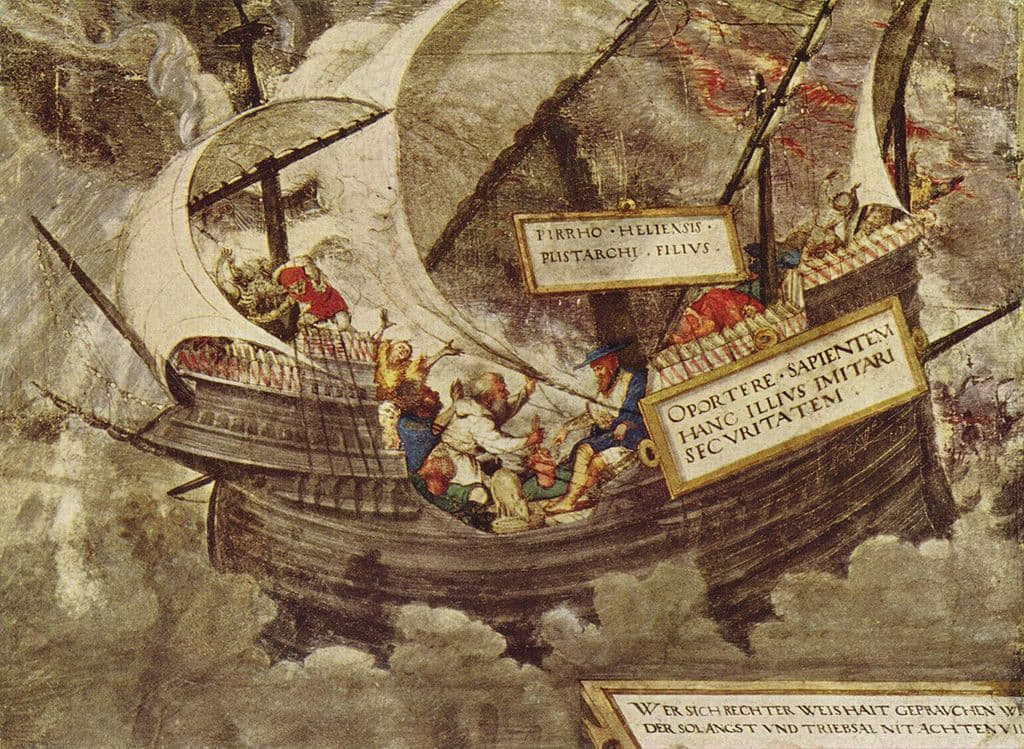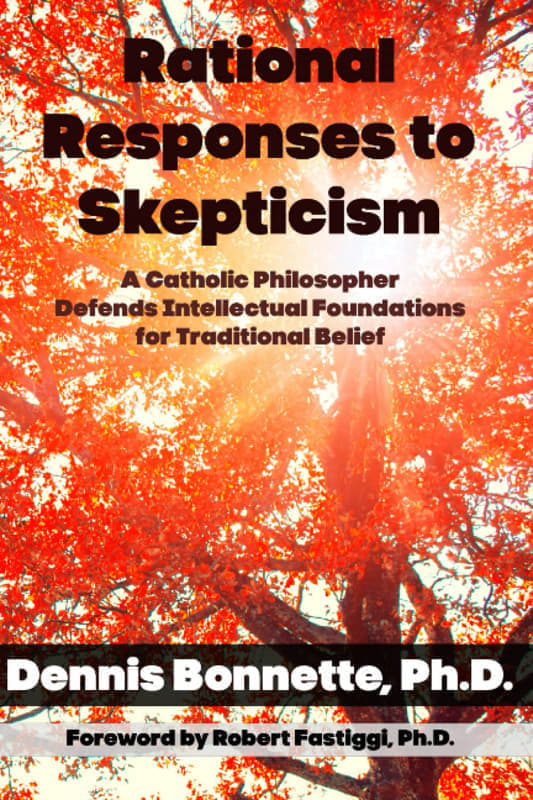This big fat book (571 pages), Rational Responses to Skepticism, is an anthology of Dennis Bonnette’s later writings. It contains more than forty essays on a variety of philosophical topics.
But who (you may ask) is Dennis Bonnette? For one, he’s a philosopher. More precisely, he’s a Catholic philosopher. More precisely still, he’s a Catholic philosopher of the Thomistic (hence Aristotelian) persuasion.
He is the author of two previous books, Origin of the Human Species (three editions so far) and Aquinas’ Proofs for God’s Existence.
Among Bonnette’s other achievement are these, that he is the father of seven adult children and the grandfather of twenty-five children.
Bonnette was a college professor of philosophy for forty years. Upon retirement, he found that he could not renounce his teacherly addiction to explaining difficult philosophical ideas. And so, no longer able to explain them orally to undergraduates, he took to explaining them in writing to broader and more well-educated audiences. It should be noted that, because these audiences included critics who issued critiques that were far more challenging than a teacher would find in a college classroom, Bonnette was compelled, in his written explanations, to work at a more precise and more sophisticated intellectual level. This book is made up of many of these later explanations, all of which first appeared in online journals.
Not the least merit of this volume is that it is written with clarity. My guess is that Bonnette’s ability to explain things clearly is the result of his old job requirement—he had to explain some rather difficult philosophical ideas to college students for whom philosophy was not at the top of the list of their worldly concerns. This is like Lincoln’s talent for plain writing, a talent very probably developed by his professional need to explain things to juries made up of prairie farmers and shopkeepers. Bonnette knows how to write a plain English sentence. He knows how to write economically; for instance, he will illustrate a point with one example instead of five or ten. And although his subject matter often compels him to use a technical vocabulary, he doesn’t revel in technicalities as many academics do.
In short, Bonnette writes for an audience of educated laypersons who happen to have an amateur interest in following philosophical arguments. He never forgets who makes up his intended audience.
It should come as a surprise to no one that Bonnette discusses a number of topics that have long been near and dear to the hearts of Thomists and Aristotelians. For instance:
- The existence of God
- The nature of God
- The spirituality of the human soul
- The immortality of the human soul
- The distinction between sense knowledge and intellectual knowledge
- The first principles of reason
- The principle of non-contradiction
- The principle of sufficient reason
- The principle of causality
- Natural law
- Free will
- The impossibility of infinite regress
- The existential contingency of everything that is not God
- Metaphysical certitude
- That an infinity being (God) alone can create being out of non-being
- The distinction between time and eternity
- That everything moved is moved by another
- The problem of evil
But Bonnette also deals with some post-13th-century questions, questions that have emerged since the modern scientific revolution. For instance:
- Modern naturalism and materialism
- Modern skepticism and agnosticism
- The compatibility of Thomism and modern physics
- Darwinian evolution
- The idea of “existential inertia”
He even deals with some “current affairs” issues. For instance:
- Ape language
- Space aliens
- Artificial intelligence
- Abortion
And he touches on a few specifically Catholic issues. For instance:
- The heavenly knowledge of the Virgin Mary
- Can the reality of Hell be reconciled with the goodness of God?
- The apparitions at Fatima
- Adam and Eve
- Why Catholics are prone to believe in miracles
At first glance this book is a hodge-podge collection of articles dealing with this and that; a mere miscellany. But look closer and you’ll see that there is a unifying theme running through its nearly-600 pages. Bonnette sees that modern atheism or naturalism is the great contemporary danger faced by Christianity in general and Catholicism in particular, and he further sees that skepticism—the belief that it is impossible for human beings (i.e., rational animals) to know anything with certainty—underlies atheism/naturalism. What’s more, he is convinced that Thomism is the philosophy best able to refute skepticism and naturalism.
I recommend this book for well-educated lay Catholics who are looking for an intellectual challenge. Professional philosophers and theologians will also profit from it. And it should be considered for advanced undergraduates taking courses in Thomism.
It is not a book that must be read starting at page one. You can start in the middle. You can begin with the book’s final essay. You can skip around. In fact you’ll be better off if you skip around (as I myself did). This is a book for grazing, the way cows in a field graze. They never try to eat everything all at once.
David R. Carlin is a former Democratic Majority Leader of the Rhode Island Senate, a retired professor of sociology and philosophy at the Community College of Rhode Island, and the recent author of Atheistic Humanism, the Democratic Party, and the Catholic Church.
Featured: The Calmness of the Philosopher Pyrrho in the Storm, perhaps by the Master of Petrarch, ca. early 16th century.

